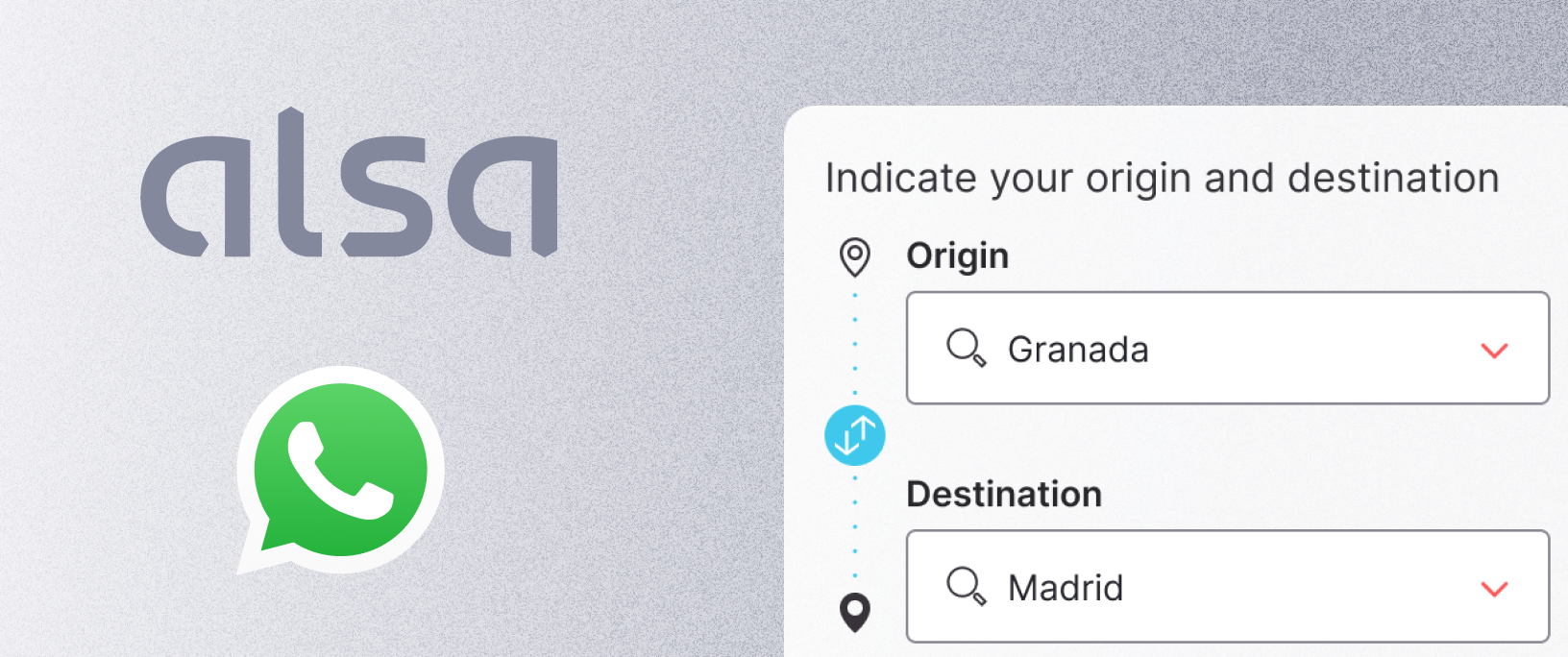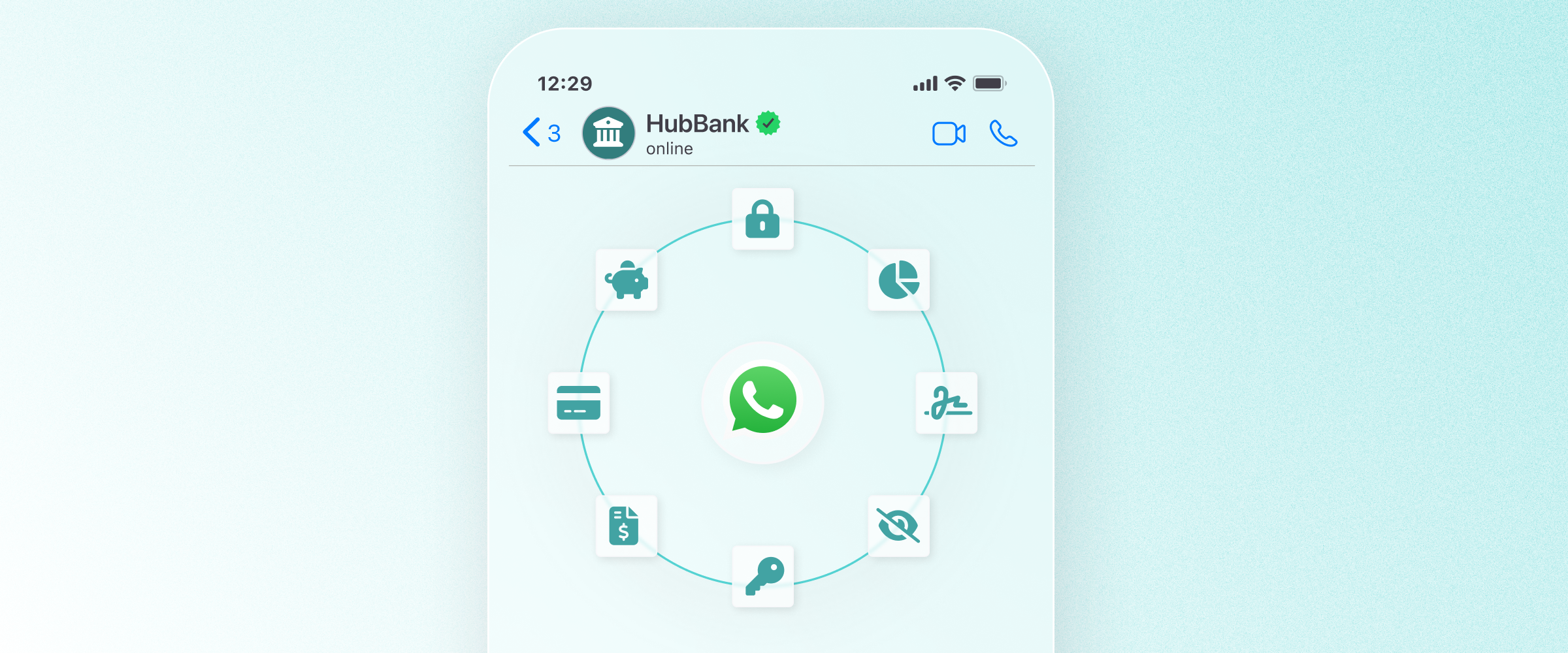- Discover why WhatsApp is now a core support channel for leading global brands
- Learn how the WhatsApp Business API enables automation and CRM integration
- See how shared inboxes and call deflection streamline support operations
- Understand the impact of chatbots and rich media on customer experience
- Explore real examples from Decathlon, easyJet, and Allianz
- Measure the business impact: higher CSAT, lower costs, increased revenue
Key points
Companies around the world — including leading brands in the UK — are using WhatsApp for customer service. They’re automating use cases, improving customer experiences, and making more money doing it.
Let’s take a look at what makes WhatsApp a powerful customer service tool and 3 examples we can learn from.
Why Businesses Use WhatsApp for Customer Service?
WhatsApp is the most popular customer support channel
WhatsApp has over 3 billion monthly users, meaning that more than a quarter of the world’s population uses WhatsApp.
Today, leading companies treat WhatsApp as a core part of their enterprise customer service strategy.

Good customer service reduces friction and makes things easy for customers. Therefore, using messaging channels they already know and love is a no-brainer.
That’s why many are turning to a WhatsApp customer support platform—not just a messaging channel, but a foundation for fast, scalable and automated service.
WhatsApp Business API
WhatsApp has a robust API available for businesses. The WhatsApp Business API is the foundation of any serious automation strategy. It allows companies to connect WhatsApp to other tools they already use—like CRM systems, ERP platforms, and ticketing tools.
For example, CRM integration with WhatsApp means agents can access full customer context and past interactions within the same workflow. This not only speeds up support but also personalises the experience.
When evaluating the best WhatsApp business providers, it’s important to choose official partners that ensure compliance, scalability, and integration flexibility.
Need help assessing WhatsApp API integration? Get a tailored overview.
Managing customer conversations with a shared team inbox
When using WhatsApp’s business tools, companies can access a team inbox. Any customer service professional knows how important it is to be able to aggregate conversations. Without a shared inbox, collaboration is close to impossible.
Companies using WhatsApp for customer service can easily route conversations to the right team member. This not only saves time internally but also helps customers get their issues resolved faster.
Another high-impact use case is WhatsApp call deflection. Instead of keeping customers on hold in traditional call centres, businesses can reroute phone traffic to WhatsApp—where customers engage on their own time and agents handle multiple cases at once. It’s a win-win for cost and experience.
Automating customer support with WhatsApp chatbots
The WhatsApp Business API enables you to build and use chatbots on WhatsApp. You can quickly greet customers who reach out and ask them essential questions about their identity and purpose for contacting you.
By the time a human agent connects with a customer, they already know who they're dealing with and the context, speeding up the process for everyone involved.
You can also automate your frequently asked questions. Our clients find that FAQ-related inquiries make up nearly 80% of their customer interactions. By automating these questions, agents have more time to handle complex issues.
It's important to note that automation isn’t just about efficiency and scale. It helps you offer immediate, personalised, and contextual service. The more you connect WhatsApp to your internal tools, the more effective your chatbot becomes.
Ultimately, automated customer support with WhatsApp helps teams reduce time-to-resolution, increase agent efficiency, and deliver the kind of service today’s customers expect.
Engaging customers with rich media
Last but not least, WhatsApp is a developer’s dream for building rich media experiences. A major benefit of using WhatsApp is that you can use buttons, quick replies, product carousels, voice memos, photos, maps, WhatsApp webviews and other types of rich content.
Using this rich content makes conversations more engaging. It eliminates the need for customers to type everything out, thus reducing the time to resolution.
WhatsApp wants to be the place where commerce happens. As such, they have created tools like WhatsApp flows and continue to add features that make it attractive for both businesses and customers.

Hubtype Advisors
As companies look to leverage WhatsApp for customer service, it’s essential to consider solutions that address industry-specific challenges. For instance, Hubtype Advisors provides specialised solutions for the insurance sector, tackling issues such as security, personalisation, and compliance. This tool facilitates seamless, secure communication between clients and agents, ensuring smooth and compliant customer interactions.
Benefits of using WhatsApp for customer service
WhatsApp increases customer support efficiency
WhatsApp makes customer service teams more efficient. You can collaborate through a shared inbox, automate FAQs, and easily share documents that add context to conversations.
If you’re like most companies, you’ll probably find that FAQs make up 80% of your total inquiries. By implementing WhatsApp automation for these FAQs, your human agents will be ready to handle more complex questions.
More control over the customer journey
These days, gaining control over the customer journey requires technology. With so many different channels, markets, languages, and departments (do we need to go on?) it’s absolutely critical to have technology in place that can connect all of the dots.
WhatsApp’s API makes it a flexible solution that can play nicely in this complex sandbox. For starters, instead of conversations existing in silos, the entire team can work in sync to make experiences better.
Because you can connect WhatsApp to other tools (like real-time analytics and reporting) you get better insights for decision-making. In short, it’s a powerful tool for omnichannel orchestration and creating a seamless customer journey.
Discover what better messaging could mean for your business. Talk to a CX specialist.
WhatsApp improves customer satisfaction and response times
People like WhatsApp. They also like fast service. With 82% of consumers expecting immediate responses to routine inquiries, the traditional interaction methods just don't cut it anymore.
So, it’s no surprise that WhatsApp improves customer satisfaction rates. In fact, many of our customers have doubled their net promoter scores (NPS) after combining WhatsApp and automation.
In addition to speed, people like the visuals that WhatsApp offers. Just like in any other conversation, when it’s easy to communicate our points, we typically find the conversation more enjoyable. When you use buttons, product photos, and visuals, the conversation is easier and more engaging.
In fact, it only takes one positive experience on WhatsApp for it to become the channel of choice for customers. As a result, over time, you can phase out the channels that bring down customer satisfaction scores and drain your resources.
Customer retention and loyalty
Customer service is a key driver of customer retention (or customer churn). For 86% of people good customer service turns one-time clients into long-term brand champions.
Similarly, one-third of consumers would switch companies after a poor customer service experience.
WhatsApp has been proven to increase customer satisfaction, retention, and loyalty. By prioritising the user experience, companies using WhatsApp have a leg up on the competition.
Increased revenue
Lastly, it’s no surprise that companies using WhatsApp for customer service can increase their revenue. Higher profits are a natural result of all the benefits we mentioned above.
Consider the following statistics:
- Improving customer experience by just one point can drive more than a billion dollars in revenue (Forrester)
- Companies that excel at the customer experience drive revenues 4% to 8% higher than those of their market (Bain and Company)
- Increasing customer retention rates by 5% increases profits by 25% to 95% (Harvard Business Review)
So, now that we’ve gone over the (many) benefits of WhatsApp for customer service, let’s see some use cases in action.
3 Great examples of companies using WhatsApp for customer service
Let’s review 3 great examples of companies using WhatsApp for customer service.
1) Decathlon (Retail)
Decathlon is the world’s largest sporting goods retailer and operates over 1,749 stores in 78 territories worldwide. It is the market leader in Spain by far, generating over €15.8 billion in revenue each year.
Like any major retailer, Decathlon deals with a variety of customer support issues. They offer assistance in buying equipment, field questions about in-store experiences, as well those related to order tracking and return policies.
Before using WhatsApp, Decathlon offered email and phone support. But, these channels slowed down their response times. They wanted to offer a more convenient customer service experience without hiring more agents.
Objectives
- Increase customers' self-serving simple queries
- Maintain or improve customer satisfaction score
- Improve the response time for customers
Solution
Decathlon adopted WhatsApp for customer service. It started with simple automation flows and agent handover. It was important for Decathlon to make sure the team was not overwhelmed with increased volume, and automation helped them do that.
A bonus for Decathlon is that WhatsApp is asynchronous. Meaning, unlike phone or web chat, customers typically multitask, dipping in and out of conversations. For Decathlon, this means that agents are able to handle multiple tickets at once.

Key results
- Bots currently handle 22% of all queries
- 50% decrease in average handling time
- 4.5/5 average CSAT score for WhatsApp users
- 98% reduction in time to respond for agents
Clearly, Decathlon is a great example of a company using WhatsApp for customer service. They were about to impact key metrics related to efficiency and customer satisfaction.
2) easyJet (Airline)
As one of Europe’s largest low-cost airlines, easyJet has long relied on a self-service strategy to maintain low operating costs and maximise upsell revenue. However, with rising customer expectations and unpredictable spikes in service demand—from natural disasters to travel disruptions—the airline needed a more resilient, scalable support model.
Its existing reliance on phone support and a limited webchat solution left it vulnerable during crises. The answer? A shift toward messaging-first customer service, led by WhatsApp.
Objectives
- Make WhatsApp a core customer support channel
- Deflect calls and reduce pressure on the call centre
- Automate complex use cases to improve resolution time and unlock revenue opportunities
Solution
easyJet partnered with Hubtype to transform its support strategy around messaging. WhatsApp became a central channel for handling both simple and complex queries. A phased rollout included a new chatbot integrated into both webchat and WhatsApp, enabling fast resolution of high-volume requests.
Key improvements included IVR-to-WhatsApp deflection, a transactional bot for upsell use cases (like adding baggage), and full CRM integration for seamless case management. Multilingual support and automated translation helped support customers across multiple markets without increasing operational burden.

Key Results
- 62% of customer cases resolved through automation across webchat and WhatsApp
- 22% of phone calls deflected to WhatsApp through IVR
- 28% reduction in total call centre volume
- 74% faster resolution when adding baggage via messaging
- 9.6 CSAT score
- Scaled to handle a 40% increase in customer interactions during peak periods
Ready to see your use case mapped out? Book your walkthrough.
3) Allianz (Insurance)
Allianz is a German multinational financial services company with over 128 million customers across nearly 70 countries. Allianz offers a wide range of insurance products, including property, life, health, and credit insurance, as well as asset management services.
With growing service volumes, Allianz saw an opportunity to enhance the claims experience and shift service demand away from traditional channels like call centres.
Objectives
- Increase customer satisfaction
- Reduce the volume of cases handled by phone
- Automate complex customer service scenarios
Solution
Allianz worked with Hubtype to automate the car claim process using WhatsApp. Through the use of webviews, customers could now file car claims quickly and without friction, all within a familiar messaging interface. Additionally, Hubtype implemented phone IVR deflection, enabling callers to seamlessly transition from voice to WhatsApp-based self-service.
Key Results
- 87% customer satisfaction
- 23% of phone calls deflected to WhatsApp
- 42% of claims handled end-to-end through automation
Join these companies using WhatsApp for customer service
As an enterprise WhatsApp solution, Hubtype helps leading brands scale automation, reduce call centre load, and deliver world-class customer experiences.
Get started by booking a demo with our team. Or learn more about our conversational platform.











.jpg)
